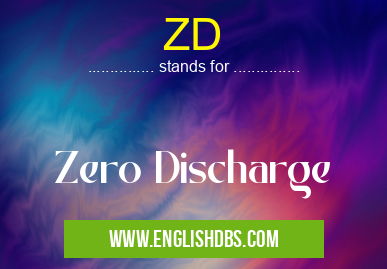What does ZD mean in UNCLASSIFIED
ZD stands for Zero Discharge. It refers to a system or process that aims to eliminate or minimize the discharge of wastewater or other effluents into the environment. The goal of ZD is to protect water resources and ecosystems by preventing pollution and conserving water.

ZD meaning in Unclassified in Miscellaneous
ZD mostly used in an acronym Unclassified in Category Miscellaneous that means Zero Discharge
Shorthand: ZD,
Full Form: Zero Discharge
For more information of "Zero Discharge", see the section below.
Objectives of ZD
- Eliminate wastewater discharge: ZD systems strive to prevent the release of wastewater into water bodies, such as rivers, lakes, and oceans.
- Reduce water consumption: By eliminating wastewater, ZD helps conserve water resources and reduce the demand for water treatment.
- Protect ecosystems: Wastewater discharge can contain pollutants that harm aquatic life and ecosystems. ZD systems aim to prevent these pollutants from entering the environment.
- Comply with regulations: Many regions have strict regulations governing wastewater discharge. ZD systems help industries and municipalities meet these requirements.
ZD Technologies
ZD systems employ various technologies to achieve zero discharge, including:
- Advanced wastewater treatment: Treatment processes that remove pollutants to a high degree, allowing for reuse or evaporation.
- Water reuse: Reusing wastewater for various purposes, such as irrigation, industrial processes, or toilet flushing.
- Evaporation: Evaporating wastewater to convert it into water vapor, which can be condensed and reused.
Benefits of ZD
- Environmental protection: Protects water resources and ecosystems from pollution.
- Water conservation: Reduces water consumption and promotes sustainability.
- Cost savings: Eliminating wastewater discharge can lower treatment and disposal costs.
- Regulatory compliance: Ensures compliance with environmental regulations.
Essential Questions and Answers on Zero Discharge in "MISCELLANEOUS»UNFILED"
What is Zero Discharge (ZD)?
Zero Discharge (ZD) is a sustainable water management practice that aims to eliminate all wastewater discharges and maximize water reuse within an industrial facility.
What are the benefits of ZD?
ZD offers numerous benefits, including:
- Reduced water consumption and operating costs
- Improved environmental performance and compliance
- Enhanced public image and corporate social responsibility
- Potential for revenue generation through water reuse
How is ZD achieved?
ZD is achieved through a combination of technologies and practices, such as:
- Advanced wastewater treatment systems
- Process modifications to minimize wastewater generation
- Water recycling and reuse systems
- Zero Liquid Discharge (ZLD) technologies that concentrate and recover water from wastewater
What industries can implement ZD?
ZD is applicable to a wide range of industries, including:
- Chemical and petrochemical
- Food and beverage
- Pharmaceutical
- Metal and mining
- Textile and leather
Final Words: Zero Discharge (ZD) is a critical approach to protecting water resources and ecosystems. By eliminating or minimizing wastewater discharge, ZD systems play a vital role in preventing pollution, conserving water, and ensuring environmental sustainability.
ZD also stands for: |
|
| All stands for ZD |
